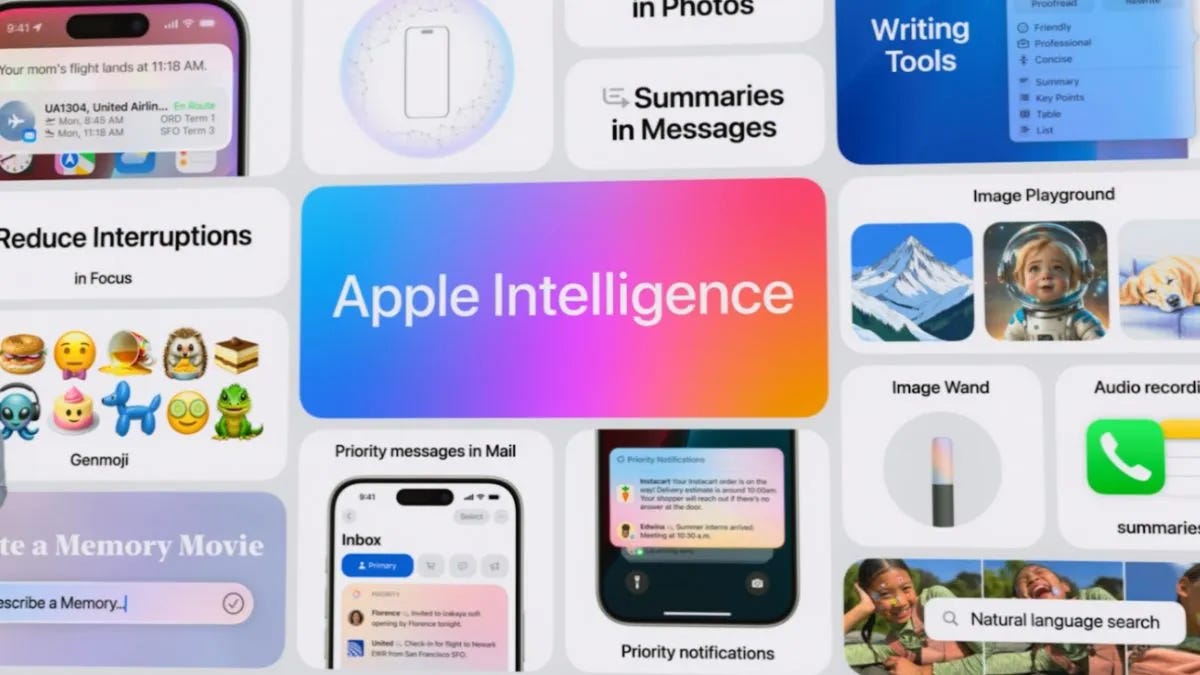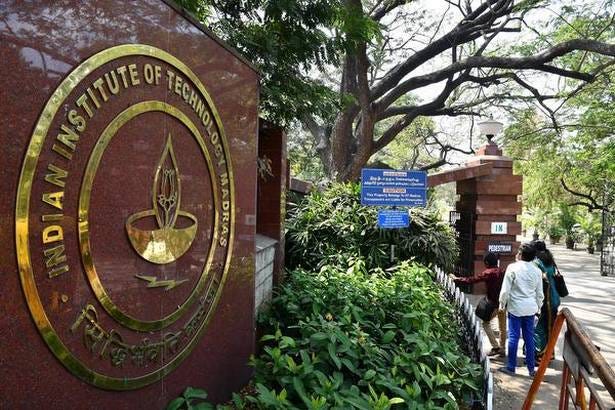Welcome to the latest edition of The AI4India Weekly!
This issue is packed with insights into the transformative potential of artificial intelligence (AI) across diverse sectors. Join us as Alok Agarwal, Co-Founder of AI4India, shares his perspective on leveraging AI for the benefit of individuals, corporations, and a Viksit Bharat.
Discover how AI4India is spearheading efforts to revolutionize public safety with its Vision AI model, ensuring real-time monitoring and alerts to enhance security nationwide. We also explore Apple's latest innovations in AI, IIT Madras' pioneering indigenous AI solutions, and the groundbreaking developments in Bengaluru's transit system as BMTC and Namma Metro open up their real-time data. Read on as we delve into these stories and more, shedding light on AI's pivotal role in shaping India's technological future.
AI Applications – How to make AI work for people, corporations and a Viksit Bharat
by Alok Agrawal
One question that gets asked most often when the topic of AI comes up. ‘What are the applications for me and my company?’
On the one hand there seems to be a certain fatigue setting in among users, after the initial euphoria, now that they have generated enough pictures and essays. On the other hand, tech companies believe this will the biggest opportunity ever, and continue to pour Billions behind AI related technology and infrastructure. Competition is revving up among companies and nations alike to take a pole position.
However, some may argue that if the gap between tech and applications persist, AI may end up being yet another bubble.
I am with the believers. I strongly believe that, with the right applications, AI has the power to transform lives in ways and scale not seen before. But to truly harness the potential of AI, we need to stop thinking in terms of technology (we must leave that to the tech geniuses) and start thinking about how AI can act as a force multiplier to human actions and how we as humans ultimately will shape our behavior due to AI.
This piece will try and explore this aspect.
First, AI at a fundamental level, gives machines (computers) the ability to start thinking like human beings. This ability is still at an early stage but improving exponentially.
Most AI applications started by addressing one parameter and are now adding more to become truly omni modal or multi modal. Take your pick of the terminology.
Thus, to develop AI applications, we need to start looking at tasks which are mundane for humans, or beyond human ability. Below is a starter list of 16 such possible AI assistants. These can be applied across all industries.
Office assistants - AI assistants that are trained and fine-tuned on enterprise data, which help employees in any function, access relevant information easily and create relevant documents – from presentations to spreadsheets, legal documents to business plans.
Research assistants – AI assistants that work with researchers to search or generate synthetic data, process data, formulate and tabulate results and prepare reports
Linguistic assistants – AI assistants that convert text to audio and audio to text. Translate text to text and audio to audio in any language. This can break all language barriers, especially in a country like India with a large number of languages.
Music assistants – AI assistants or tools that have the ability to understand music and songs and generate new music and songs. Combining this ability with human creativity will lead to generation of a vast amount of new music. Also add the ability to cut/ trim/ remix and we have an endless possibilities for new entertainment products.
Video assistants – AI assistants at this stage have good ability to understand video but are limited in video generation. This ability will improve. But they still offer great benefit in editing, production, scripting and special effects. Many tools enable easy creation of training and presentation videos.
Coding assistants – From coding in computer language to coding in your language is a transition being enabled by AI tools. They provide ability to read and understand code, debug code, write new code and assist in deploying the code. This enables a vast opportunity for almost any user to create a digital product by describing it in their language.
Accessibility assistants – AI applications will enable devices to provide access to people who may be impaired in some functions viz speech, hearing, sight etc. This will provide additional freedom and opportunity to such individuals.
Creative assistants – AI tools have ability to generate drafts of text, pictures, scripts, audio and video. Combined with human creativity, they can become assistants in brain storming ideas and developing an endless stream of creative content.
Public safety assistants – Cameras, mics and speakers at public places, enabled with AI can serve as eyes and ears with real time intelligence to flag off untoward incidents and announce alarms. It is not manually possible to watch or man all public locations, nor monitor video feeds real time. Vision AI watchdogs can do that for us.
Humané user interface – Most of the world’s information is digitized and is easily available. Yet most people struggle to access this information and utilize it in a meaningful way as they are constrained by a UI which they are not comfortable with. AI enabled interface that allows users to simply talk to their devices, the way they want, and utilize the information will democratize access. This will open up digital commerce and services segments to a much larger audience.
Healthcare assistants – AI can read and decode DNA like no human can. It can diagnose and provide prognosis. And then can be trained to create and a test a large number of new molecules for new drugs. They can read images from scans. All this means AI tools can accelerate advancements in medicine and healthcare, assist medical professionals in handling diagnosis at scale and empower them to deliver healthcare services speedily and affordably.
Teaching (education) assistants – Rather than view AI as replacing teachers, it is more effective to look at them as becoming teaching assistants, supplanting the knowledge and pedagogy of teachers. AI tools can generate course material and tests, grade test papers and prepare reports, this enhancing the effectiveness of every teacher.
Personal assistants – AI assistants can help us manage our daily lives, meetings, documents, information, as a conversational friend when required and more. There are tools being developed to help health and mental wellness via a personal assistant.
Government assistants – Every citizen has multiple level of connections with the government. From fundamental rights and duties as a citizen to govt. services to taxation to govt. schemes and benefits. It gets overwhelming for most to navigate through all these services. A govt assistant can help every citizen with all the govt related duties and services, at a federal as well as state level.
Financial assistants – AI assistants that keep track of individual and/or enterprise finances, manage and navigate through the information and enable the most effective deployment.
Farm assistants – Farming may look like a simple task to city dwellers but is a challenging field full of risk and complexity. In a country like India where the majority owe their livelihood to farming, it becomes even more relevant to help the farmers. Evolution of AI farm assistants can keep the farmers informed, track the farming cycles and crops and take remedial steps at times of adversity. Integration with weather and soil data will help them significantly in taking the right decisions.
These are the most prominent 15 possible applications of AI. There can be many more specific applications.
In sum, any task a human can do, AI can assist and make us do the job better and improve productivity. Start exploring these applications for yourself, today. At AI4India, we are working with AI companies and supporting them to develop applications across some of the these areas.
NOTE : The views expressed by the author are his own. AI4India as a forum does not endorse any comments on specific brands, products, platforms or companies.
Apple Intelligence: A New Era in AI Innovation
Apple has unveiled its latest breakthrough: Apple Intelligence. This cutting-edge AI initiative promises to revolutionize the landscape of artificial intelligence, bringing advanced capabilities to everyday users. Leveraging Apple's vast ecosystem, Apple Intelligence aims to enhance user experience with smarter, more intuitive interactions across all devices.
The launch of Apple Intelligence marks a significant milestone in the AI industry, setting new standards for integration and usability. For India, this development holds immense potential, paving the way for innovative applications in sectors such as healthcare, education, and technology. As Apple Intelligence pushes the boundaries of what AI can achieve, it presents exciting opportunities for Indian developers and businesses to harness these advancements and drive forward the nation's AI ambitions.
On device and server foundation models that power Apple Intelligence
Apple Intelligence will be integrated into iOS 18, iPadOS 18, and macOS Sequoia. Central to this system is a ~3 billion parameter on-device language model designed for specialized tasks. This model operates efficiently on Apple devices, offering quick, context-specific responses without compromising privacy. Fine-tuned for activities such as text refinement, notification summarization, and in-app interactions, it leverages small neural network modules, or adapters, to dynamically adjust to various tasks while maintaining low latency and high performance. This on-device model exemplifies Apple's commitment to creating intelligent, responsible AI that aligns with their core values of user empowerment, authenticity, and privacy protection. Read more
Indigenous AI for a Diverse India: IIT Madras Leads the Way
India's unique diversity calls for AI systems tailored to its specific needs. Recognizing this, IIT Madras has launched a groundbreaking undergraduate program in AI and Data Analytics. This interdisciplinary curriculum covers essential math, AI fundamentals, computing skills, and domain-specific system building. AI is transforming our world, from homework help and strategy games to enhancing productivity and understanding biology. With this power comes the responsibility to ensure AI systems are fair, transparent, understandable, safe, secure, and accessible to all.
Cultural context significantly influences AI's effectiveness. For example, AI must navigate Indian language nuances and address biases in medical tools trained on Western populations. To meet these challenges, India needs indigenously-developed AI systems. IIT Madras's new program aims to cultivate AI experts capable of creating systems that respect and reflect India's rich diversity. By blending rigorous academic training with practical applications, this initiative promises to revolutionize AI education and innovation in India. Read More
Unlocking Real-Time Transit Data: A Leap Towards Smarter Mobility in Bengaluru
Bengaluru Metropolitan Transport Corporation (BMTC) and Namma Metro are set to open their real-time transit data, enabling startups to develop innovative applications. This initiative aims to improve user experience and operational efficiency by leveraging data from both BMTC and Bengaluru Metro Rail Corporation Ltd (BMRCL).
BMTC Managing Director R Ramachandran announced that their vehicle tracking application is being migrated to the Karnataka State Data Centre (KSDC). Once completed, real-time data will be accessible to the public. BMRCL, in partnership with Google, will also share real-time train information.
Both BMTC and BMRCL will use the General Transit Feed Specification (GTFS) for data sharing. This platform will support services like Namma Yatri for end-to-end journey planning. The World Resources Institute (WRI) will host the 'Enroute Challenge' hackathon on June 12 to encourage startups to create innovative Mobility as a Service (MaaS) applications. This initiative, promised since BMTC's 2016 Intelligent Transportation System (ITS) project, marks a significant step towards smarter, more connected urban mobility in Bengaluru. Read more
Join our AI4India.org forum to be a part of the AI revolution in India by visiting our site now.
Follow us on our X and LinkedIn to receive interesting updates and analysis of AI-related news









